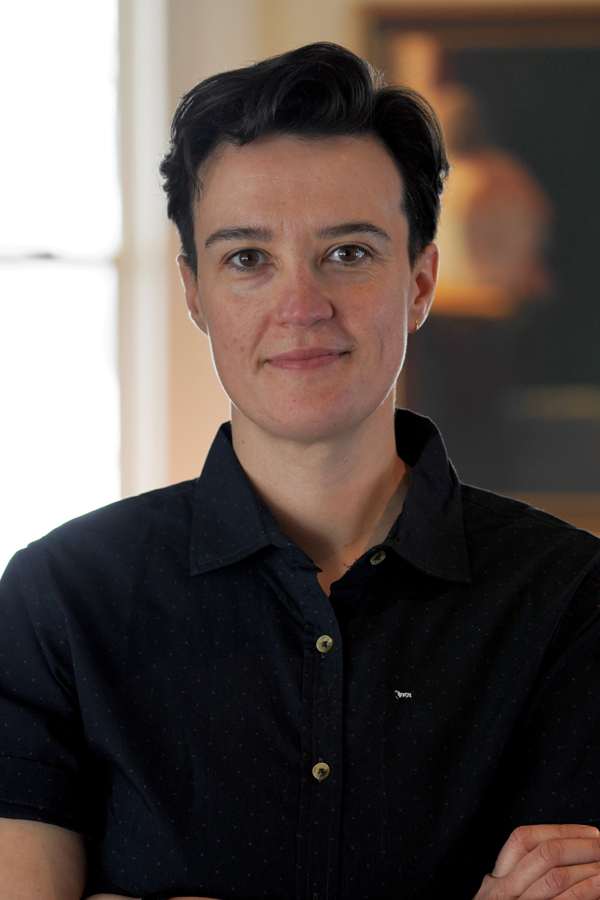
Artist: Tom Alberts (Australian, born 1962)
Oedipuzzy: Critical Psychoanalytic Interventions on Sexuation Storytellings
Presenter: Fernanda Magallanes, PhD
Discussant: Kristine Klement, PhD, RP (Qualifying)
Saturday, May 7, 2022: 10:00 am to 12:00 pm
Cost: $100
Open to all by registration.
** DISTANCE PARTICIPATION ONLY – Registration deadline is one week prior to the meeting. Preregistration is required.
During this 30–45-minute presentation, Fernanda Magallanes will talk about a new radical departure in psychoanalytic exposition in, out and beyond metapsychology, the body and the Freudian shibboleth. By letting Freud´s theory talk in the couch of feminist, queer and trans theories, a patriarchal veil that has been present in psychoanalysis and in all cinical practices will be dismantled to rethink and open up new forms of listening.
Psychoanalysis has opened our mind to give an account on how becoming a sexed body is a political process. The body is affected not only by its biology but also by the way in which the body represents culture and is represented by it. Power acts upon bodies, but not only as an alien agency, but as a marker and producer of the psychic body itself. Sexuation is therefore a form of inscription of the body, a form of writing.
A problem to think of sexuation in Psychoanalysis, is that -as most of the disicplines in the history of science- it has had an important patriarchal and heterosexual bias. By heterosexual, I do not refer to persons being attracted to persons of an “opposite sex”, but heterosexuality as a political regime, as a system that distributes bodies into historical categories: masculine and feminine. In such regime -which has been structural in culture- women and feminized subjects are subsumed (and even invented as a category) for cultural and political purposes. The sex-gender heterosexual regime has generated forms of distribution of violence where women, feminized subjects and any form of difference which is not white men is annihilated or transformed into an object of possible violence in its many different forms. In such sense, the distribution of gender creates forms of corporeality already inscripted in violence. As I pointed in my doctoral research before, The Oedipal Plot has been a good description on how bodies are sexed in patriarchy, but psychoanalysis has been a frustrated form of feminism. It has reiterated an ideal of crossing through the Oedipal stage as a form of achieving normality or as the only form of symbolic inscription into culture, instead of questioning if culture (patriarchal and heterosexual) can be changed by not ascribing into the Oedipal Plot but exploring other forms of the Symbolic.
Some questions to be explored will be: A. What is the political history of sexual difference? B. How has the heterosexual regime taken part in psychoanalysis and what are some strategies to dismantle it? C. Are we passing through an epistemic crisis of sexual difference? D. What human and political interests contribute to normalizing the heterosexual matrix? E. Is kinship always already heterosexual? F. How does kinship relate to The Symbolic and the process of writing in psychoanalysis? G. How does psychic writing determine our bodies and sexual difference? H. How does repetition compulsion contribute to the reiteration of the sex-gender regime? I. What is the performative power of language in psychoanalysis? J. What strategies through writing may help us re-imagine a world without violence and give an account of ours? H. What is the importance of practices of listening, dissident writing and psychoanalytic intervention in the streets?
*Reading material may be supplied if and only if participants ask for it.
Learning Objectives:
At the end of the session participants will be able:
- Participants will discuss clinical applications of the Oedipal myth and the Oedipal complex in currently clinical practice when working remotely (mediated with technology).
- Participants will discuss the concept of an“Oedipal Emplotment” as a transference and countertransference dynamic that gets reenacted in the psychotherapeutic relationship.
- Participants will learn tools to dismantle forms of listening that are in the patriarchal domain and will question if other forms of symbolization which are not within the limits of patriarchy may be possible. This will have an effect on the way we think of psychopathology and abnormality, as the case may be that the psychopathology comes from the norm that inflicts a patriarchal form of listening in the analyst/psychotherapist.
ATPPP Scientific Committee
Marco Posadas, MSW, RSW Chair
Claire Lunney, MD, CCFP
Lindsay Barton MA, RP, CAPCT
Kristine Klement PhD, RP (Qualifying)
 Fernanda Magallanes
Fernanda Magallanes
Fernanda Magallanes, PhD is a practicing psychoanalyst and doctor in Philosophy (European Graduate School) who dedicates her life to psychoanalysis and its intersections with feminisms, philosophy and ethics of nonviolence. Her work has also focused during the last years on research at Universidad Nacional Autónoma de México (Philosophy and Psychoanalysis as Political Fronteers) and teaching as professor type A in the department of Philosophy at Universidad Iberoamericana. She has imparted several seminairs on sexual difference, Dissident Literature, Feminisms and Psychoanalysis at Círculo Psicoanalítico Mexicano. Fernanda´s research is actually (this semester) running independently and focused in reinventing psychoanalysis and re-reading theories of corporeality and Metapsychology towards forms of intervention in the streets, that may help alleviate social and psychic suffering.
Publications:
Published books:
- Magallanes, Fernanda (2019) Psychoanalysis, the Body and the Oedipal Plot: A Critical Re-Imaging of the Body in Psychoanalysis. Routledge: UK. ISBN 9781138391260
- Magallanes, Fernanda ((2015) ¿Qué quiere una mujer?: Lo femenino en psicoanálisis. Letra Viva: Buenos Aires. ISBN 978 950 649 633 3 (What Does a Woman Want?: The Feminine in Psychoanalysis)
Published chapters in books:
- Magallanes, Fernanda (2020) Abyección, juego, sublimación: bases para una política de resignificación radical de las lógicas de poder. (Abjection, Playing and Sublimation: on Radical Resignification of Power). In the book: Martínez Ruíz, R. (2020) Lo psicopolítico: una crítica desde la filosofía. Monosílabo: Mexico City. ISBN: 978 607 8729 01 2 (The Psycho-political: A Philosophical Critique) p.p. 69-89
- Magallanes, Fernanda (2020) El camino y el desierto: notas hacia una teoría metapsicopolítica. (Notes Towards a Metapsychopolitical Theory). Virtual book of the Federal Psychoanalytic Association of Latin America (FEPAL): http://www.fepal.org/wp-content/uploads/2020/12/Fernanda-Magallanes-ESP.pdf
- Magallanes, Fernanda (2020) Androcracia del símbolo, violencia estructural. (Symbol Androcracy: Structural Violence) In the book: Castro, Alfredo (2020) ¿Por qué las violencias?: psicogénesis psicoanalítica. ETM: Mexico City.ISBN: 978 607 7817 58 1 (Why violence?: Psychoanalytic Approaches) p.p.299-315
- Magallanes, Fernanda (2021) Alegato por una simbolización más allá de la estructura patriarcal del lenguaje. (A Plea for a Symbolic Beyond the Patriarchal Structure of Language) In the book: Martínez, Rosaura (2021) Psicoanálisis, deconstrucción y crítica de lo psicopolítico. Akal: México City. (Psychoanalysis, deconstruction and a critique of the psycho-political). p-p- 353-374
- Magallanes, Fernanda (2021) Despatriarcalizar la teoría: reabrir el conducto auditivo.(Depatriarchalization of Theory: On Opening the Ear to Listen) In the book: Bonoris, Bruno and Palma, Tomas. (2021) Afluencias: Escritos sobre el psicoanálisis que nos toca. Órbita Lúcida: Buenos Aires. (Influx: Writings on psychoanalysis today).
Published articles:
- Magallanes, Fernanda (2011) Cuadernos de psicoanálisis, Asociación Psicoanalítica Mexicana, A.C., julio-diciembre 2010, VOL.XLIII, Fernanda Magallanes, La imagen del padre en México (the Image of the Father in Mexico) ISBN-10 : 6079137070, ISBN-13 : 978-6079137076
- Magallanes, Fernanda (2012) Cuadernos de psicoanálisis, Asociación Psicoanalítica Mexicana, A.C., enero-junio de 2012, VOL. XLIV, Fernanda Magallanes, Leopoldo María Panero: Poesía y psicosis. (On Poetry and Psychosis: Leopoldo María Panero) ISBN-10 : 6079137089, ISBN-13 : 978-6079137083
- Magallanes, Fernanda (2020), Revista 25 de la Sociedad Peruana de Psicoanálisis. (Peruvian Society of Psychoanalysis) “Reimaginarizar Edipo: deconstruyendo el binarismo sexual y la heteronormatividad”. P. 109-120 (Re-imaging Oedipus: Deconstructing Sexual Binarism and Heteronormativity).ISSN:1812-7330
- Magallanes, Fernanda (2021), Diánoia Diánoia, vol. 66, no. 86 (mayo–octubre 2021), p75-78 Reseña bibliográfica . Eros más allá de la pulsión de muerte. (Review of Rosaura Martínez book Eros: Beyond the Death Drive). ISSN:1870-4913
- Magallanes, Fernanda (2021) Notas hacia una teoría metapsicopolítica y de imaginación corporeopolítica. (Notes towards a metapsychopolitical theory and corporeopolitical imagination) Artcile in Asociación Psicoanalítica de Buenos Aires Magazine. vol. XLVIII. APdeBA: Buenos Aires.
- Magallanes, Fernanda (2022) Canalizando un rayo violeta: luz desde y fuera del continente obscuro. (A Violet Light: Feminism in and out of Psychoanalysis´ Dark Continent) Magazine: Espectros del psicoanálisis. Espectros del Psicoanálisis: Ciudad de México.
 Kristine Klement
Kristine Klement
Kristine Klement Ph.D. R.P (Qualifying) is a psychotherapist and advanced psychoanalytic candidate in private practice in Toronto. She is faculty in the School of Gender, Sexuality, and Women’s Studies at York University, and the Toronto Psychoanalytic Society & Institute. She has written on representations of women’s mental health, the aesthetic and political uses of hysteria, psychoanalysis and #MeToo, and intersectional feminist pedagogy.
Refunds must be requested in writing two weeks prior to the beginning of a course. A handling fee of $30 will be retained. After these two weeks, fees cannot be returned.
For more information about and for registration in the tps&i Extension Programs, Scientific Meetings, Training Programs, Study and Supervision groups and Special Presentations, please visit our website: torontopsychoanalysis.com or email info@torontopsychoanalysis.com
